Is Doxxing Illegal In Alaska?
- Doxxing
- Is Doxxing Illegal?
- Is Doxxing Illegal In Alaska?
Table of Contents
Residents of Alaska who are interested in protecting their online privacy may wonder: Is doxxing illegal in Alaska?
In this guide, we’ll examine the state’s legal guidelines to determine whether doxxing is illegal and how doxxing-adjacent criminal activities, including swatting, are handled.
Is Doxxing Illegal in Alaska?
The act of doxxing someone – or sharing their personal information online without their permission – is not explicitly illegal in Alaska.
Doxxing-Related Activities That Are Illegal In Alaska
Although there are no laws covering doxxing in Alaska, there are several doxxing-related activities that are illegal in the state. These include harassment, criminal trespass, stalking, interference with emergency communications, false information or reports, extortion, and coercion.
Harassment
In Alaska, it’s considered harassment in the second degree (Alaska Stat. § 11.61.120) if someone deliberately taunts or insults you in a provocative manner, calls you at odd hours or refuses to hang up, subjects you to offensive physical contact, or distributes sexually offensive media of you or to you.
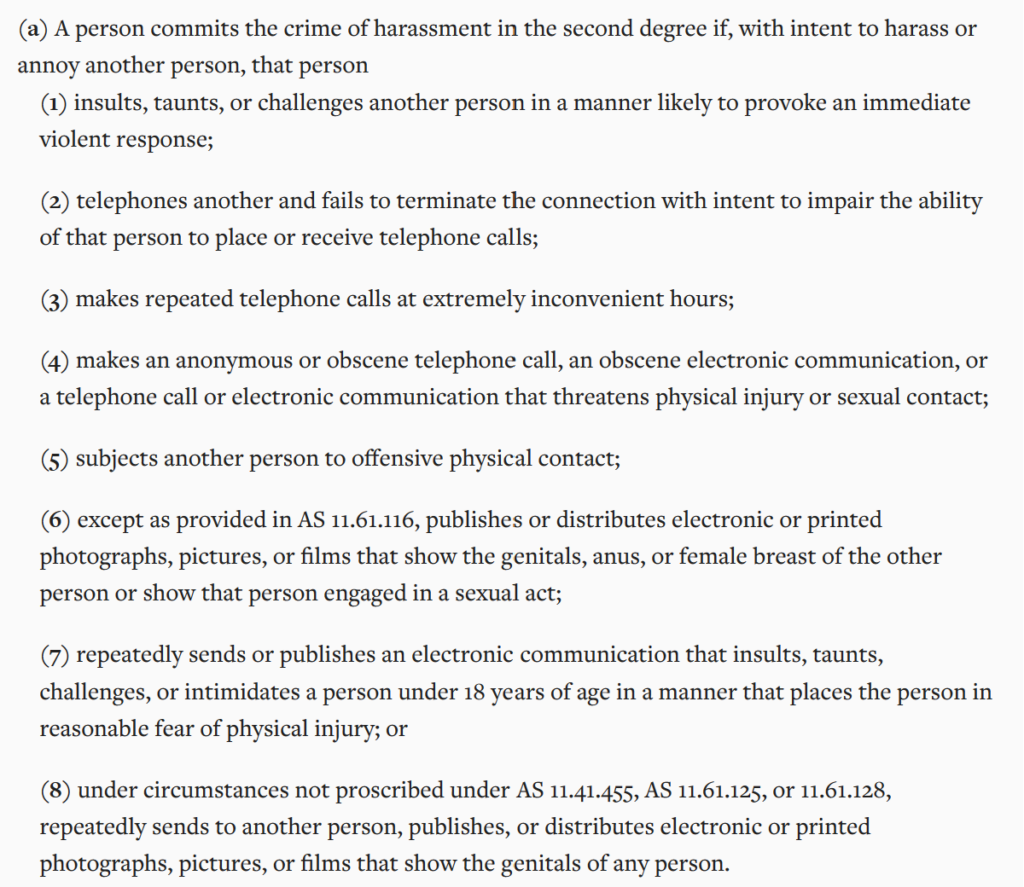
If any of the above happen, it’s a Class B misdemeanor with an ensuing penalty of up to 90 days in jail and/or a fine of up to $2,000.
If the offender physically touches you with bodily fluids (whether human or animal) or if they touch a private part of your body, the charge can be elevated to harassment in the first degree (Alaska Stat. § 11.61.118).

In these cases, it’s a Class A misdemeanor, entailing jail time of up to one year and/or a fine of up to $25,000.
Criminal trespass
Once someone knows where you live or work, it’s possible that they’ll engage in criminal trespass.
In Alaska, trespass in the second degree (Alaska Stat. § 11.46.330) happens if it’s “in or upon premises” or in a moving vehicle.

This is classed as a Class B misdemeanor and is penalized with up to 90 days in jail and/or a $2,500 fine.
In situations where the perpetrator “enters or remains unlawfully” on land with intent to commit a crime there, or if they enter or remain in a dwelling, it’s trespass in the first degree (Alaska Stat. § 11.46.320), an associated Class A misdemeanor with a penalty of up to a year in jail and/or a $25,000 fine.

Stalking
Stalking (Alaska Stat. § 11.41.270) is defined in Alaska as knowingly engaging in conduct that puts another person (or their loved one) in fear of injury or death.
The types of behavior listed under stalking include sending emails to someone, contacting them by telephone, or following their physical location using an app, all of which could come after being doxxed.
The full list of types of nonconsensual contact is as shown:
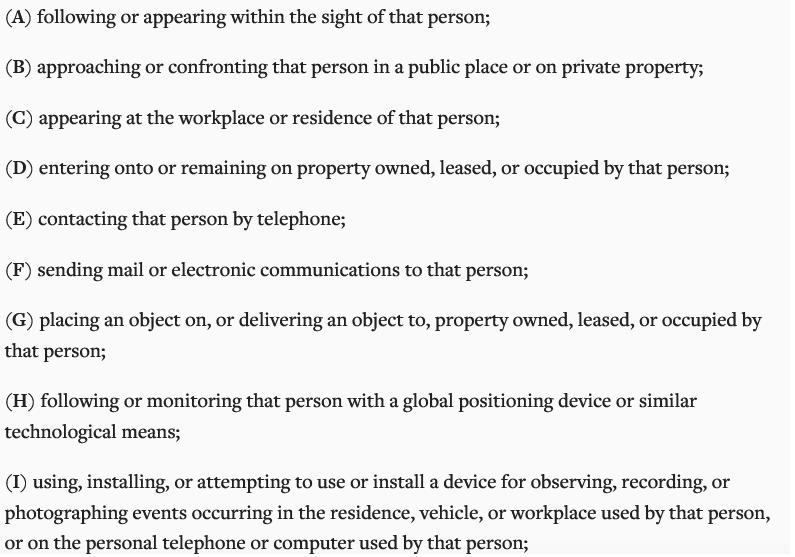
If someone engages in these behaviors in Alaska, it’s stalking in the second degree. That’s a Class A misdemeanor resulting in up to one year in jail and/or a $25,000 fine.
In cases where the victim is under 16, or the perpetrator uses a deadly weapon or is a repeat offender, it’s considered stalking in the first degree (Alaska Stat. § 11.41.260).
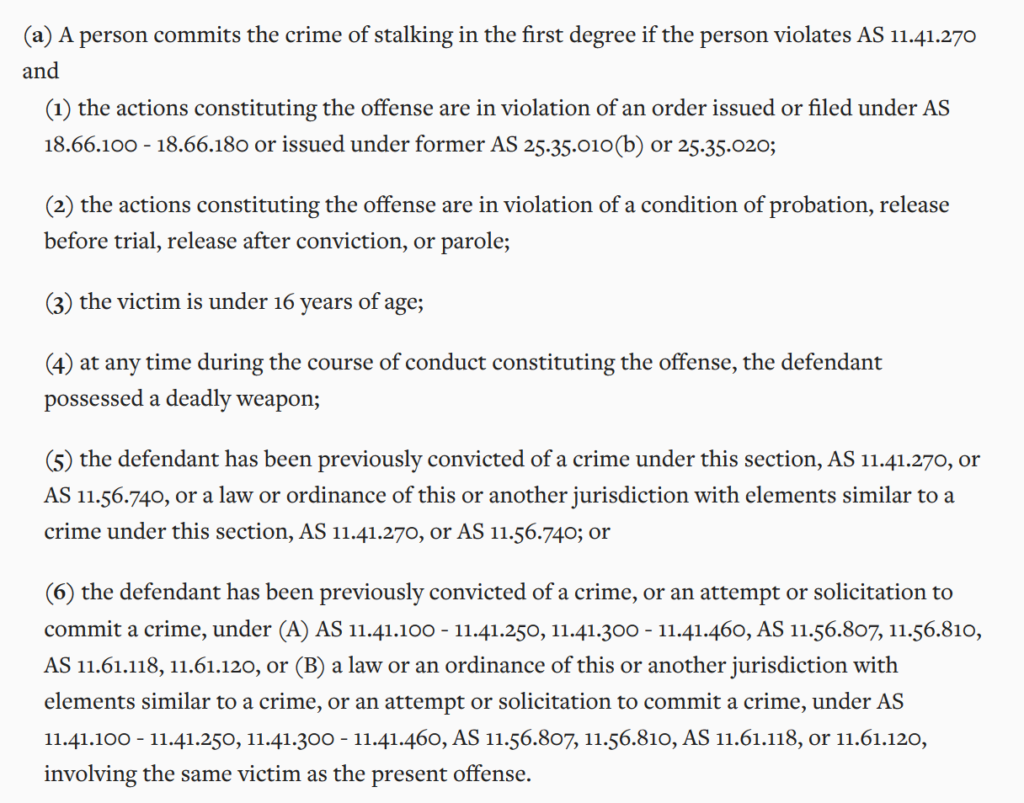
This is punishable as a Class C felony, which in Alaska amounts to up to five years in jail and/or up to a $50,000 fine.
Interference with emergency communications
Being doxxed is closely related to being swatted, which occurs when someone calls the police to make a fake report to summon an emergency response against an unsuspecting victim.
When someone repeatedly calls law enforcement about a non-existent emergency or an already-reported emergency or threatens an emergency communications worker, they can be charged with interference with emergency communications (Alaska Stat. § 11.56.785).
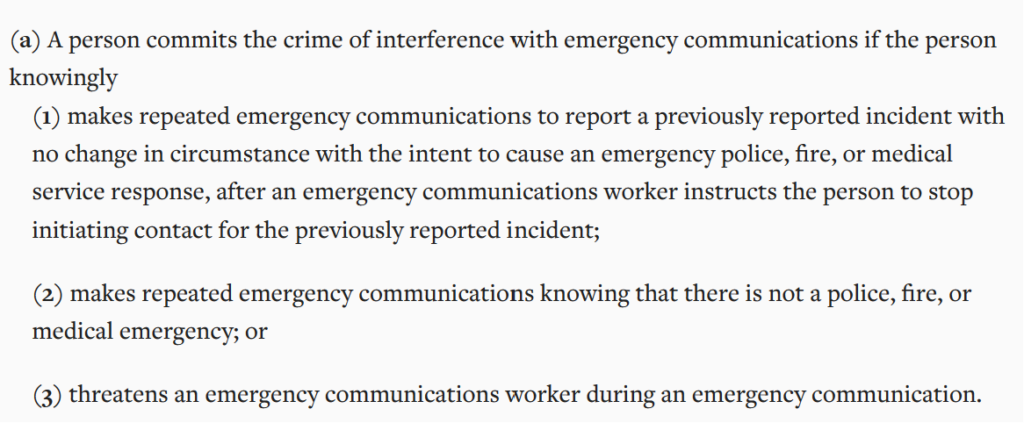
The penalty for swatting someone in Alaska is a Class B misdemeanor punishable by up to 90 days in jail and/or a $5,000 fine.
False information or report
Someone who knowingly makes a false report about a crime or gives false information in an attempt to implicate another person in a crime can be charged with false information or report (Alaska Stat. § 11.56.800) in Alaska.
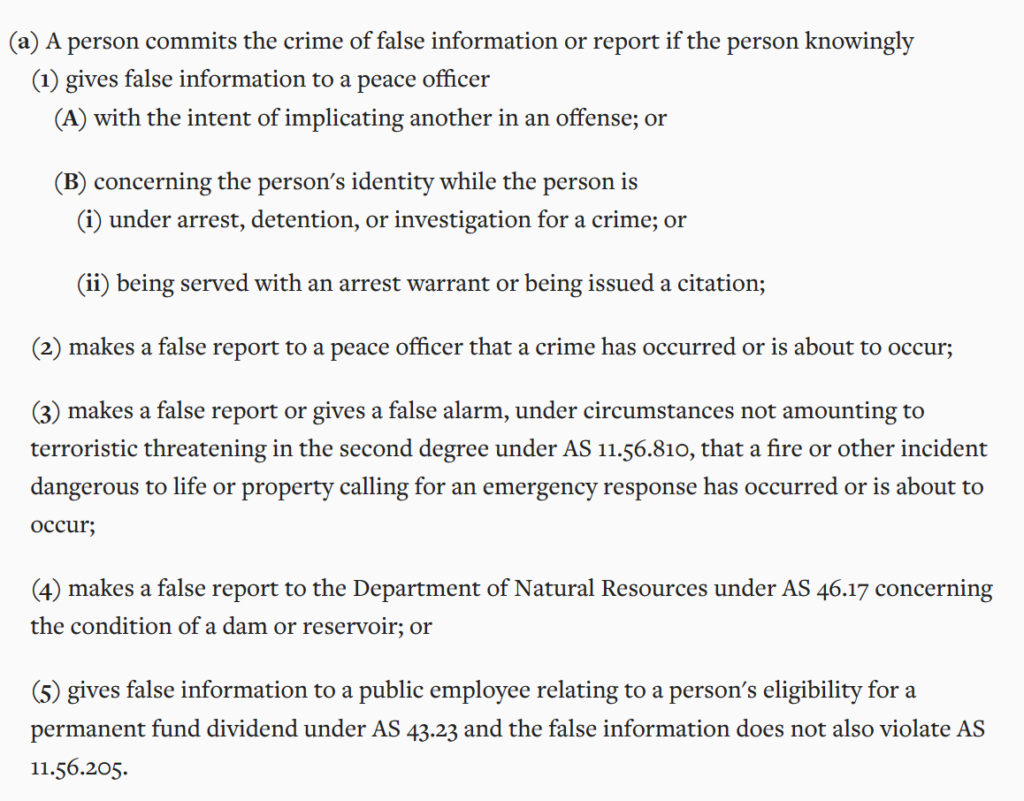
It’s a Class A misdemeanor with associated jail time of up to one year and/or a fine of up to $25,000.
Extortion
Extortion (Alaska Stat. § 11.41.520) entails someone obtaining the property of someone else through the threat of physical violence, being accused of a crime, exposing confidential information, taking or withholding action as a public servant, or withholding or providing testimony.
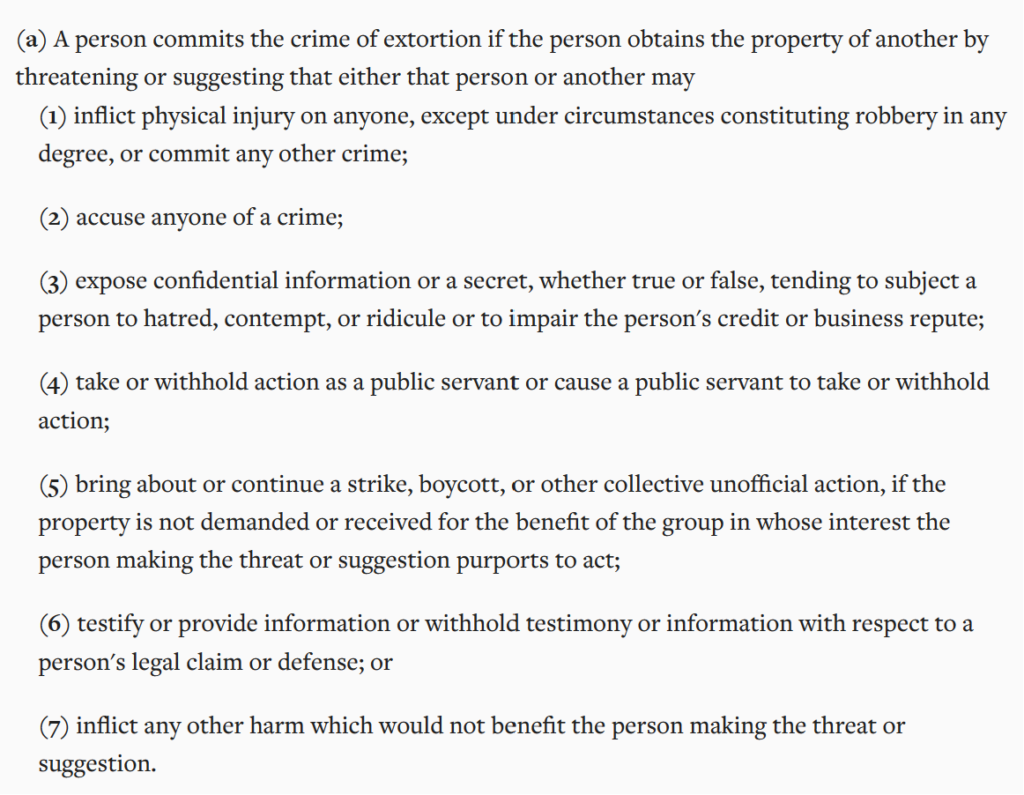
Extortion is a Class B felony in Alaska, which means perpetrators can face up to 10 years in prison and/or a fine of up to $100,000.
Coercion
Like extortion, coercion (Alaska Stat. § 11.41.530) involves threatening someone with similar means (physical violence, being accused of a crime, etc.), but rather than gaining someone’s property, perpetrators get them to do something for them.
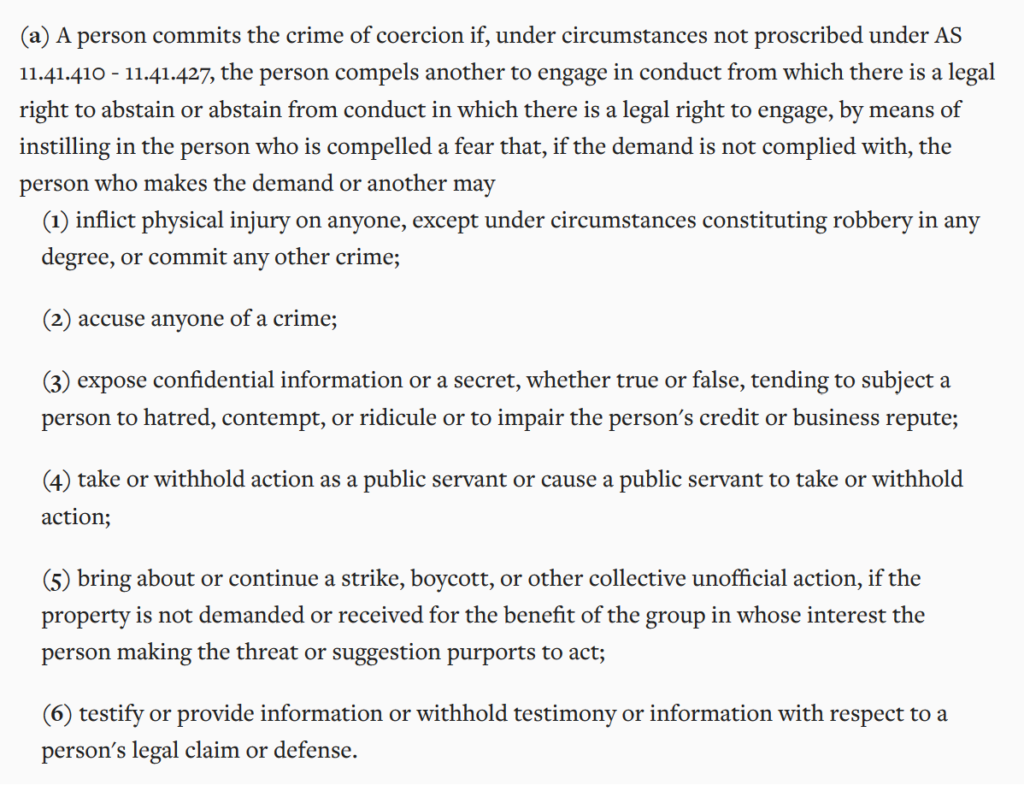
Coercion is a Class C felony in Alaska, punishable by up to five years in jail and/or a $50,000 fine.
Is Doxxing Illegal at the Federal Level?
There is no federal anti-doxxing law at present.
Instead, more and more states around the country are passing their own individual doxxing laws, including California, Arizona, and Illinois.
Because of this, it’s particularly important for residents of Alaska and other states to take their information privacy into their own hands by becoming as undoxxable as possible.
How to Protect Yourself Against Doxxing In Alaska (And Elsewhere)
To make yourself undoxxable, you must work on shrinking your online footprint.
To do so, you can start by doxxing yourself (learn how in our guide to self-doxxing using this list of doxxing tools). This will give you a clearer picture of where your personal information vulnerabilities are and what steps you should take next to close them up.
For most people, becoming undoxxable will involve:
- Opting out of data brokers. Data brokers are companies that collect personal information about people from sources like social media and public records and compile it into profiles that are sold for a minimal fee. You can opt out of data brokers, but note that you will need to repeat the process whenever your profile is reactivated when more data is invariably found online. Alternatively, data broker removal services like DeleteMe can handle the opt-out process for you.
- Changing your social media settings from public to private.
- Using unique account names and passwords for all of your accounts.
- Deleting unused apps that could be harvesting your data.
- Requesting the removal of your data from Google products.
Learn more in our guide on how to prevent doxxing.
DeleteMe is our premium privacy service that removes you from more than 30 data brokers like Whitepages, Spokeo, BeenVerified, plus many more.
Save 10% on DeleteMe when you use the code BLOG10.
Our privacy advisors:
- Continuously find and remove your sensitive data online
- Stop companies from selling your data – all year long
- Have removed 35M+ records of personal data from the web
Save 10% on any individual and family privacy plan with code: BLOG10












